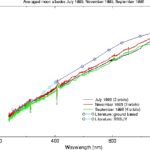Ear popping is a common and usually benign sensation, especially during air travel or when changing altitudes. While it can be a relief when your ears pop and pressure is released, persistent or painful ear popping can be a sign of an underlying issue. Understanding why your ear is popping, what symptoms to watch out for, and when to seek medical advice is crucial for maintaining ear health.
Decoding the Pop: The Eustachian Tube’s Role
The sensation of your ears popping is directly related to the Eustachian tube, a small passage that connects your middle ear to your nasopharynx (the upper part of your throat and nasal cavity). This tube plays a vital role in equalizing pressure between the middle ear and the outside environment. When the air pressure outside changes, such as when you ascend or descend in an airplane, the pressure in your middle ear needs to adjust to prevent discomfort and potential damage.
Normally, the Eustachian tube opens briefly to equalize this pressure, often triggered by actions like swallowing, yawning, or chewing. The “pop” you hear and feel is the sound of air pressure being normalized as the Eustachian tube opens and allows air to flow in or out of the middle ear. This is a healthy and necessary function of your ear.
Common Causes of Ear Popping
Occasional ear popping is usually nothing to worry about. Here are some common situations and conditions that can lead to ear popping:
- Altitude Changes: As mentioned earlier, changes in altitude, such as during flying, driving through mountains, or even riding in elevators, are frequent triggers. The rapid pressure changes necessitate Eustachian tube function to equalize the pressure.
- Swallowing and Yawning: These actions naturally open the Eustachian tube, allowing for pressure regulation. You might notice your ears pop when you swallow or yawn, especially if you are experiencing slight pressure changes.
- Eustachian Tube Dysfunction (ETD): This condition occurs when the Eustachian tube does not open or close properly. ETD is often caused by:
- Colds and Flu: Viral infections can cause inflammation and swelling of the nasal passages and Eustachian tube lining, leading to blockage.
- Allergies: Allergic reactions can similarly inflame the nasal passages and Eustachian tube, causing dysfunction.
- Sinus Infections: Inflammation and congestion from sinus infections can also affect the Eustachian tube.
- Environmental Irritants: Smoke, pollutants, and dry air can irritate the nasal passages and contribute to ETD.
Symptoms That Accompany Ear Popping and When to Be Concerned
While ear popping itself is often normal, certain accompanying symptoms should raise concern and warrant a visit to a healthcare professional. Pay attention to these symptoms along with ear popping:
- Ear Pain or Discomfort: If ear popping is accompanied by pain, pressure, or a persistent feeling of fullness in the ear, it could indicate a problem like Eustachian tube dysfunction or an ear infection.
- Muffled Hearing: If your hearing becomes muffled or sounds distant alongside ear popping, it could be a sign of fluid buildup in the middle ear or other hearing-related issues.
- Ringing in the Ears (Tinnitus): Ear popping associated with tinnitus could be linked to Eustachian tube dysfunction or other inner ear problems.
- Dizziness or Balance Issues: The inner ear plays a role in balance. Ear popping accompanied by dizziness or balance problems may suggest an inner ear condition that needs evaluation.
- Persistent Symptoms: If ear popping and related symptoms last for more than a couple of weeks, or if they worsen, it is important to seek medical advice.
- Sudden Hearing Changes: Any sudden changes in hearing, even if accompanied by ear popping, should be evaluated promptly by a doctor as it could indicate conditions requiring urgent treatment.
Treatment Options for Problematic Ear Popping
Treatment for ear popping depends on the underlying cause. For simple cases related to altitude changes, the popping usually resolves on its own or with simple maneuvers like swallowing or yawning. However, for persistent or problematic ear popping, treatment options include:
-
Home Remedies and Over-the-Counter (OTC) Medications:
- Swallowing, Yawning, Chewing Gum: These actions can help open the Eustachian tube.
- Valsalva Maneuver: Gently try to exhale while pinching your nose and closing your mouth. This can sometimes force air into the Eustachian tube. (Perform gently and avoid forcing too hard).
- Nasal Decongestants: OTC nasal decongestant sprays or oral medications can help reduce nasal congestion and open up the Eustachian tube, especially helpful for flying or diving.
- Antihistamines: If allergies are contributing, antihistamines can help reduce inflammation and congestion.
- Nasal Steroid Sprays: For persistent Eustachian tube dysfunction, doctors may recommend nasal steroid sprays to reduce inflammation in the nasal passages and around the Eustachian tube.
-
Medical Procedures:
- Ear Tubes (Tympanostomy Tubes): For children and adults with chronic Eustachian tube dysfunction or recurrent ear infections, ear tubes may be recommended. These small tubes are surgically inserted into the eardrum to ventilate the middle ear and equalize pressure, preventing fluid buildup.
- Balloon Dilation of the Eustachian Tube: This minimally invasive procedure involves inserting a small balloon into the Eustachian tube through the nose and inflating it to widen the tube and improve drainage and airflow. This is an option for adults with persistent ETD that doesn’t respond to medication.
When to See a Doctor
While occasional ear popping is normal, it’s crucial to be aware of when it signals a potential problem. Consult a healthcare professional if you experience:
- Ear popping that is painful or causes significant discomfort.
- Persistent ear popping that doesn’t resolve within a few days or weeks.
- Ear popping accompanied by any of the concerning symptoms mentioned earlier (muffled hearing, tinnitus, dizziness, sudden hearing changes).
Early diagnosis and treatment can prevent complications and ensure optimal ear health. Don’t hesitate to seek medical advice if you are concerned about your ear popping.
